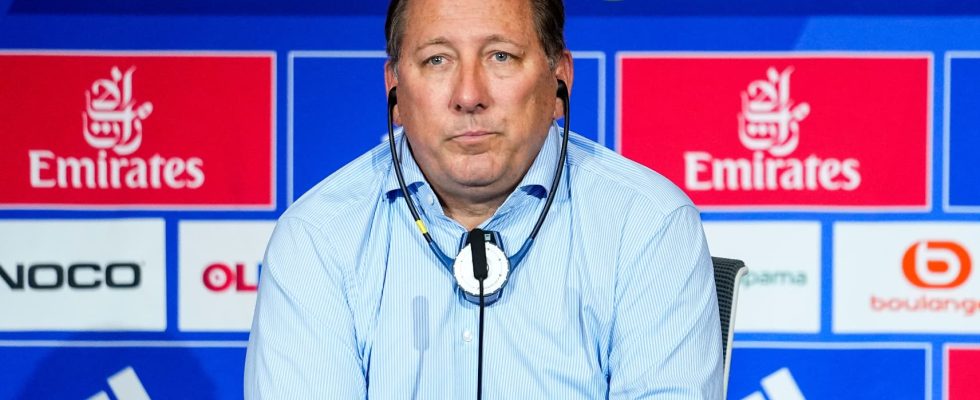The clash between OM and OL, scheduled for this Sunday in Ligue 1, was postponed after the Les Gones bus was stoned. John Textor, the owner of the Lyon club, assures that his team still wanted to play the match. A version contradicted by the Professional Football League and referee François Letexier.
There will be no Olympico this Sunday evening at the Vélodrome stadium. The clash between OM and OL, counting for the tenth day of Ligue 1, was postponed after the Lyon bus was stoned. Two windows of the vehicle were broken by paving stones and Fabio Grosso, the Gones coach, was injured above the eye. The Italian technician had to have stitches put in when he arrived at the stadium, his face covered in blood. Despite this serious incident, John Textor, the owner of OL, ensures that his team wanted to play this meeting in Marseille.
Textor: “A decision beyond our control”
“Our team wanted to play, we said we were ready to play, explained the American businessman on Prime Video. I am very proud of the captain (Alexandre Lacazette, Editor’s note). It was very moving. We saw blood coming out of his head. He wasn’t really lucid, because he got shrapnel too. The decision (to postpone) is beyond our control.”
“These are shocking scenes. Fabio Grosso had a big injury. I tried to have a chat with him to see how he was. This is not how football should be played. I don’t know if It’s the referee’s decision, I don’t know who made the decision, Textor continued. The last time I saw Fabio he was waiting for medical advice he couldn’t hold a conversation. He received broken glass, it was not just the stone. I am very angry. Our coach challenged our team to be ready. Our fans wanted to see this match played. There is nothing worse than this that happened.”
The referee: “OL’s position was clearly not to participate in the match”
In the process, the Professional Football League denied Textor’s comments by publishing a press release affirming that the Lyonnais had not wanted to enter the field. “OL have made known their opposition to taking part in the meeting given the circumstances,” wrote the LFP. A version supported by François Letexier, the match referee, who spoke on Prime Video. “OL’s decision not to participate in the match was confirmed. They issued medical certificates for the two injured staff members who could not participate in the match. They also indicated that the players were in a state of shock and could not participate in the meeting, said the 34-year-old official. During the crisis meetings, reports are drawn up so all the comments made by all the club stakeholders were transcribed OL’s position was clearly not to participate in the match.”
“As part of a crisis unit, all parties express themselves,” added the arbitrator, specifying that John Textor had not participated in the crisis meeting which led to the postponement. The position of the ‘OM was to refer to the position of OL. There was an awareness of the seriousness of the facts. The public authorities and the prefect spoke out. Concerning me, it was established that the protocol provided that When a player on the field was injured and could not participate in the match for physical or psychological reasons, the match should not be started or resumed. But the first to speak out first are the clubs. Very clearly, unequivocally, OL indicated that they did not wish to participate in the match. Both given the state of health of the two injured people and because the players were in a state of shock.”
A change of mind in the Lyon locker room?
A few moments later, Textor came to speak again in the mixed zone. With a more nuanced speech, suggesting that the Lyonnais have changed their minds over the course of events. Even wishing for a postponement of the match: “We had an employee of ours at the meeting. I forced myself to attend. Initially, we did not ask not to play. We asked for the opinion of everyone, the staff , the players, they wanted to play the match. That’s what I understood. I saw the referee straight away, I agree with his position. We had to take into consideration what was going to happen in the stadium if the match was canceled. And then there was a medical assessment to be done for our coach. The players’ opinions began to change afterwards. We saw that Fabio Grosso was no longer himself in the changing room…”

